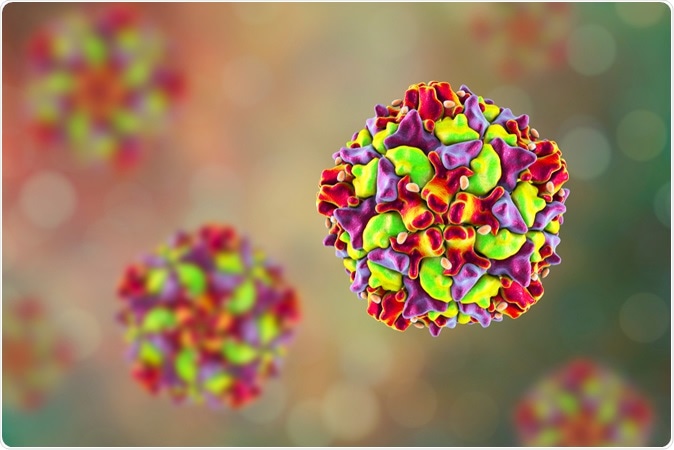
Polio returns to Papua New Guinea
A polio outbreak, the first in 18 years, has been reported by the health officials in Papua New Guinea (PNG). One case of the viral infection was confirmed in the Lufa Mountain settlement in Lae city which is the second largest city in PNG.

Poliovirus, an RNA virus from Picornaviridae family that causes polio disease, 3D illustration. Image Credit: Kateryna Kon / Shutterstock
There has been no cases of polio virus infection in PNG since 1996 and the country had been certified to be free of polio in 2000 along with the rest of the Western Pacific Region.
Polio virus was first detected in the nation this time in late April and was confirmed in May. One confirmed case usually means that the virus is circulating within the community. The Department of health is working in collaboration with the World Health Organisation (WHO) to vaccinate the vulnerable population.
Poliomyelitis is caused by a virus and leads to mild symptoms in the victim. What is dangerous about the infection is its potential to cause lifelong paralysis in children. At present there is no cure for polio virus infection but vaccinating populations effectively could be the only way to stop the spread of the infection and eliminate it from the community.
This latest case is a six year old boy from Lae city who started out with a weakness of his lower limbs earlier this year. He was confirmed to have polio infection in May. PNG’s health secretary Pascoe Kase said in a statement,
As on now stool samples of the populations living near and around the Lufa mountain settlement have been collected and examined for the virus. The virus has been found in the stool samples of two children in the region. Both of these children are healthy as of now and have shown no symptoms of the infection. The virus is capable of spreading when the faeces of the infected person contaminates the water and makes its way into the drinking water or food.
According to WHO’s representative for PNG, Luo Dapeng, the settlements like Lufa Mountain are at a greater risk of spread of this infection. The primary reason for this is the poor sanitary conditions and overcrowding that leads to increased risk of food and drinking water contamination. Further, these regions also have poor vaccine coverage he said. People living in settlements such as these usually migrate from the rural regions he said. They move into cities to search for work. Before this outbreak, Morobe province where Lae city is located, had a polio vaccination rate of 61 percent.
The officials confirmed that the virus that they isolated from the samples and from the case of polio is “vaccine derived polio virus 1”. This means that the virus is actually a mutated and altered weaker version of the polio virus that is used in vaccinations. Infections by these vaccine derived polio virus strains is rare say experts and occur only in populations where there is a low rate of vaccination. The infection occurs in unvaccinated children when they come in contact with the faeces of the vaccinated children who excrete the weaker virus after being vaccinated with it. In most communities coming in contact with the weaker virus helps the unvaccinated children develop a “passive immunity” to the infection and gives them the ability to fight the actual virus. However the same unvaccinated children can develop the infection if the community has poor rates of vaccination. These children get the infection with the weak virus that mutates into a dangerous version and may end up causing paralysis.
To curb this latest outbreak, the PNG health officials along with WHO have started immunization of the children in the regions in and around the case of polio to prevent infections. After the outbreak 845 children have been immunized against the virus. There will be two rounds of the vaccination starting mid-July that would also the nearby regions such as Eastern Highlands and Madang provinces. A total sum of $680,000 has been sanctioned for the immunization campaign say the WHO officials.






















.png)









No hay comentarios:
Publicar un comentario